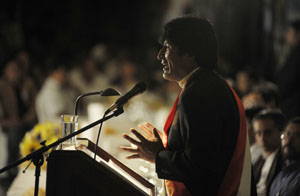
Morales Speaks of Closer Bolivia-U.S. Relations
November 2, 2009 - Latin American Herald Tribune
LA PAZ -- Bolivian President Evo Morales spoke Saturday of closer relations between the United States and his country, and said that a new accord to re-establish diplomatic ties could be signed in November.
"Our foreign minister keeps me permanently informed. At last they accepted the conditions (of the accord) with observations; there will still have to be negotiations," Morales said, referring to the work of the commissions of both countries to try and normalize the deteriorated relations after the expulsion of their respective ambassadors.
The Bolivian president said that the requirements of his government to reach this new accord are that there must be a "government-to-government cooperation" and that "United States diplomats must not be political agents."
In that sense, Morales said that last Monday, the day of his 50th birthday, he received a call from U.S. Secretary of State Hillary Clinton, who told him that "there are going to be some surprises in these negotiations of our technicians."
"I hope we can reach an agreement, I want to express my thanks if there is willingness, but the framework of renewed diplomatic relations with the U.S. will occur fundamentally if there is government-to-government cooperation, and if there are embassies that do their diplomatic work and keep out of politics," he said.
In that sense, Morales said that the ex-U.S. ambassador in La Paz who has been appointed the new assistant secretary of state for intelligence and research in Washington, Philip Goldberg, was an "intelligence agent who sought to divide Bolivia."
He also said he wasn't sorry about expelling him from the country because "beyond any socio-economic problems we Bolivians have, we're decent people."
Goldberg, who was booted out of Bolivia in September of 2008 accused by President Morales of conspiring against him, was named several days ago the new assistant secretary of state for intelligence and research.
"Now we see that Goldberg was not a diplomat but an intelligence agent that sought to divide Bolivia, and now President Obama has given him intelligence position," he said.
The indigenous leader said that negotiations between the two delegations continue and added that an outline agreement could be signed in November, when a U.S. delegation plans to visit La Paz.
"It's not certain, but maybe the outline agreement for renewed diplomatic relations can be signed in November, and we, of course, want to have diplomatic relations with the whole world for purposes of fair trade, investment and cooperation," he said.
Morales appreciated the improved relations between the two delegations and the U.S. commission's change in some of its demands.
"During the first visits of U.S. diplomats, they said that we couldn't have relations with (Hugo) Chavez, with Cuba, with Iran. But in the latest visits they've accept that we have the right to have relations with the whole world. We have begun, I don't know, perhaps to educate or change them," he said.